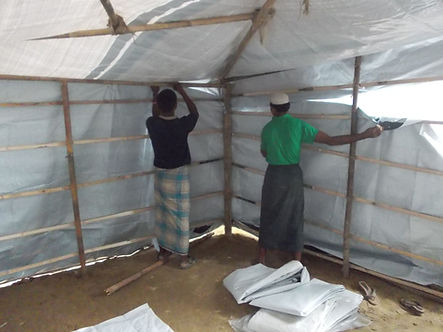The double award winning bamboo Reciprocal frame Shelter Kit (RSK)
is designed to meet Sphere standards for both recipients and Aid Agencies
2011 South Sudan. Medair
2012 Ireland. RSK
2013 Nepal. Oxfam
2014 UK. UWE University
2015 Belgium. RSK wins
2016 Myanmar. Red Cross
2017 Myanmar. Joint RSK and
2018 Bangladesh. Hospital camp
2019 UK. RSK training modules
2020 Myanmar. UNICEF take RSK
2021 Italy. After the Damages
2022 Nepal. Start training RSK
2023 Nepal. First RSK shelter team
2024 Nepal. Deployment after fire
2025 Nepal. Deployment flash floods

Standard RSK shelter built by families displaced by the Jarjakot earthquake 2023.

Double RSK shelters built for UNICEF Mahottari fire response to use for Child Friendly Center (CFC) and medical distribution units 2024

UNICEF RSK classroom Nepal 2024
Families displaced by the Jajarkot earthquake were able to build their own RSK shelters
after being shown how to use the following RSK shelter roof innovation:

3 metres

at the centre of every RSK shelter roof is a 4 bamboo pole "self-supporting" structure called a reciprocal frame
After a few minutes instruction on how to lash this frame together, the families displaced by the Jajarkot earthquake were empowered to build their own RSK shelters. The high standard of the shelters they built ensured that all 40 families (194 persons) had secure protection from the weather over the winter months.
This shelter innovation will also save considerable costs for Aid Agencies
and greatly improve their large scale disaster response capability
Day 1 of a disaster:
For large scale disasters the Emergency RSK has many distinct advantages.
This 5 person complete shelter kit uses only 9 bamboo poles and costs less than USD $30. Using 33% less bamboo
and only two different lengths of bamboo greatly reduces transport costs.
It can be rapidly assembled in less than 1 hour on slopes that are unsuitable for tents and adapted to fit any size of tarpaulin. By using the same roof frame the shelter is easily upgraded to the Standard RSK.

The Emergency RSK
By the end of day 1:
With minimal Aid Agency assistance every family should have erected and be secure inside their Emergency RSK shelter. This is possible if the two lengths of bamboo that are needed for making this shelter are made available.
Days 2 and 3 of a disaster:
Standard RSK shelters can be rapidly built by families . These highly versatile modular units provide the minimum dignified temporary living space that we aspire to achieve.
This 5 person complete shelter kit costs less than USD $45. Using only 8 poles and 4 posts this kit can also be carried. Build time is only limited by how rapid the 4 post holes are dug and is less than three hours.

The Standard RSK

Double RSK shelters can also be rapidly built by Aid agencies working with the community . Families can also easily upgrade their Emergency or Standard RSKs to this shelter as they all use the same roof panels.
The living space is easy to divide for privacy by hanging partitions from the overhead roof frames. As in the Standard RSK, ventilation is adjustable at eaves level all around the perimeter of the shelter.

The Double RSK
Days 2 to 10 of a disaster:
Modular double RSK units can rapidly provide large temporary emergency or utility shelters that may be required at this time.
Two double RSKs provide 35 square metres of covered space for a temporary classroom or a 4 bed medical ward. Adding units creates much larger wards as required.
Modular double RSK units
At any time :
The RSK roof panel can be used on its own.
For families whose dwellings have suffered severe roof damage the RSK roof panel can be cut to fit the space and provide a temporary repair.

Using an RSK panel to repair a roof
Our shelter vision:
to scale up the RSK shelter kits worldwide
FOR BOTH DISASTER PREPAREDNESS
AND
DISASTER RESPONSE
STEP 1.
EXPAND the Nepal RSK shelter program
by scaling up deployment of shelters now that we have completed the Nepal RSK shelter pilot.


STEP 2.
PROMOTE the RSK shelter preparedness template
as a short instruction session for communities living at risk of recurring hazards in both Nepal and other countries.

First RSK shelter preparedness workshop. Nepal 2013
.jpg)
UNICEF RSK shelter preparedness for 66 Delta villages at risk of flash floods. Myanmar 2020
STEP 3.
FURTHER engage with aid agencies
and the Shelter Cluster on how to build, use and scale up the RSK shelters.

UNHCR joint RSK training course Myanmar 2017

UNICEF uses two double RSKs for temporary classrooms Mahottari fire Nepal 2024
STEP 4
REACH out to medical shelter stakeholders
to fully implement the health and safety benefits of RSK shelters and thereby promote scaling up.

UNICEF use double RSK for medicines distribution Nepal 2024.


Opening up the all- round eaves ventilation. This is an option of the RSK to improve respiratory health. Cox's Bazar Bangladesh 2017.
STEP 5
DEVELOP our worldwide education plans
through schools and communities to understand and apply the RSK concept and thereby scale up its use for shelters .

Making and studying a standard RSK model. These students then proceeded to build the full size shelter. Myanmar 2015

Four volunteers lift a bamboo pole from each corner of the central roof reciprocal frame to show how it is a self -supporting structure.
Sarlahi school Nepal 2023
It is rare that a new type of shelter can directly improve the health of recipient families, especially children, and at the same time improve the safety and welfare of displaced families.
If this is a vision your organisation would like to share, please contact us.
Shaun Halbert
Director RSK Shelter Charity
